China Accuses US NSA of Major Cyberattack on National Time Center As political tensions between the US and China continue to escalate, a new front has opened in the realm of cybersecurity. China’s State Security Ministry has publicly accused the US National Security Agency of carrying out a sophisticated cyberattack operation against a critical piece of national infrastructure. The alleged attacks reportedly took place between 2023 and 2024 and targeted China’s National Time Service Center. This center, which operates under the Chinese Academy of Sciences, is responsible for generating, maintaining, and transmitting the country’s national standard time. This precise timekeeping is not just for public clocks; it is provided to and synchronizes vital sectors across the nation, including communications networks, financial markets, and defense systems. According to a post made by the Chinese agency on the social media platform WeChat, the NSA operation was highly advanced. The ministry claimed the attack utilized around 42 different types of what it described as special cyberattack weapons. The objective of infiltrating the National Time Service Center, they stated, could have led to severe consequences, including the disruption of network communications, financial system operations, and even the national power supply. The WeChat post provided further details on the methods allegedly used. It claimed that the NSA exploited security vulnerabilities within the messaging system of an unnamed foreign mobile phone brand. This technique was reportedly used to steal sensitive information directly from the devices of staff members working at the time center. As of now, the NSA has not issued a public response to these specific accusations. This allegation from China comes amidst a backdrop of ongoing mutual accusations of cyber-espionage between the two superpowers. In a separate but related development, the US Treasury Department recently stated that it was itself the target of a cyberattack in December, which it attributed to a China state-sponsored actor. This tit-for-tat exchange highlights the persistent and escalating digital cold war playing out between the world’s two largest economies.

